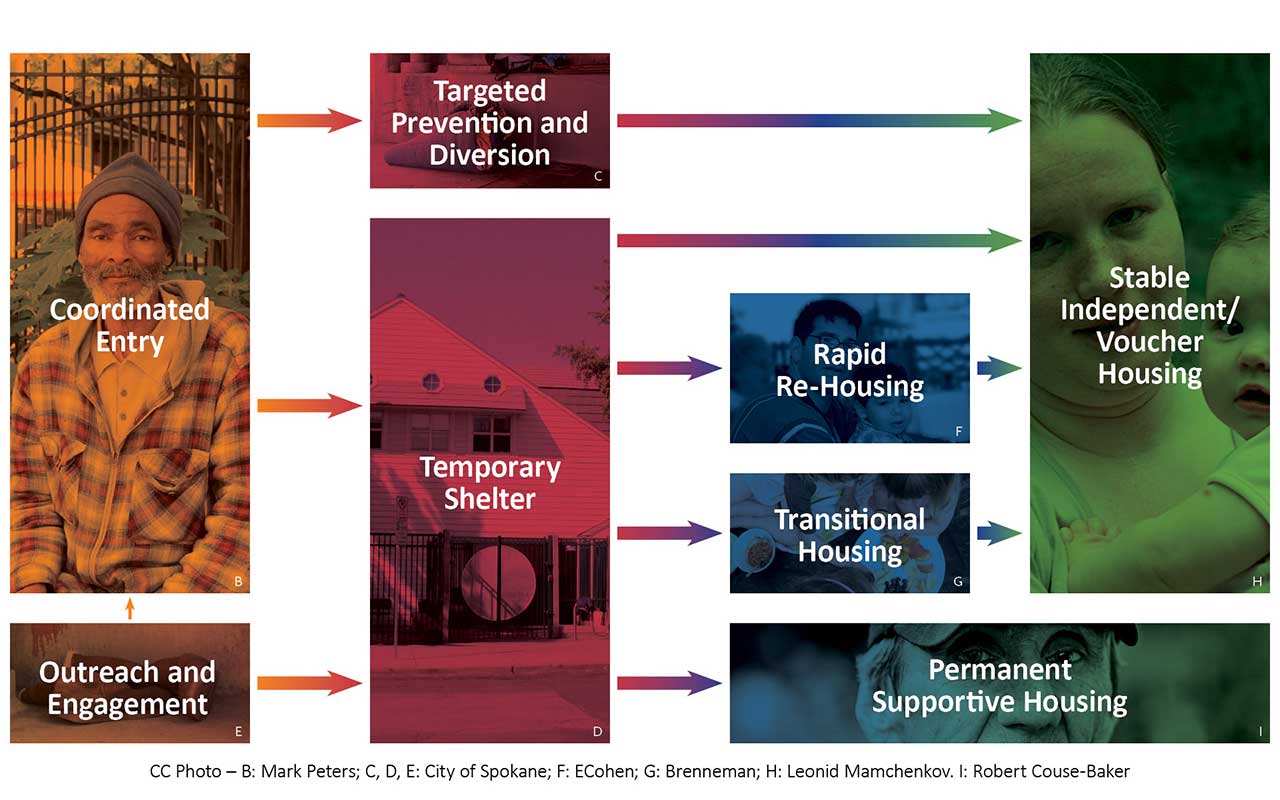
Learn About the City’s Continuum of Care Program
Rebekah Hollwedel, Homeless Programs Specialist, No Phone Number Available
Wednesday, April 12, 2017 at 3:29 p.m.

Updated: 04-17-2017
In the City of Spokane, people experiencing homelessness are provided services that target their barriers and needs to achieving housing stability. This is done through what is called a “Continuum of Care”, or CoC. Spokane’s CoC provides a suite of services for people experiencing homelessness that is supported through multiple local, State, and Federal funding sources. The CoC is governed by a Board made up of local government, service providers, stakeholders, and people who have experienced homelessness. The Board is guided by the United States Department of Housing and Urban Development (HUD) and the United States Interagency Council on Homelessness (USICH) national goals in ending homelessness amongst those who are chronically homeless, veterans, unaccompanied youth, and households with and without children to tailor our community’s crisis response system to the needs of our community members facing a vulnerable place in their lives. The CoC Board is designed to promote community-wide planning, strategic use of resources for addressing homelessness, and to improve coordination and integration with mainstream resources and other programs targeted to people experiencing homelessness. The Board also provides community leadership to further our goals around improving data collection and performance measurement and, ultimately, tailoring our suite of services to address the challenges the community faces by utilizing our strengths and leveraging partnerships and community support.
Our community provides a wide range of services to displaced persons. Emergency shelter is the first point of entry into our Continuum of Care. The goal of emergency shelter is to provide as few barriers as possible to give people experiencing homelessness a safe place to be, while also allowing the coordinated care process to begin by connecting these community members with coordinated entry staff. Coordinated entry staff perform an assessment to determine individualized levels of need and employ what is called “progressive engagement” to strategically utilize resources to provide the level of assistance needed. Through outreach and engagement, we can target high utilizers of system resources.
Progressive engagement begins as soon as homeless community members are assessed via coordinated entry. Households with children are assisted through Homeless Families Coordinated Assessment that is operated by Catholic Charities of Spokane. Spokane Neighborhood Action Partners (SNAP) operates our community’s coordinated entry specific to households without children, referred to as Singles Homeless Coordinated Assessment. Through this process, people experiencing homelessness are assessed to determine the appropriate level of assistance needed. The Coordinated Entry process connects them to various types of services needed to help people that are displaced move into transitional and permanent housing, with the goal of long-term stability. It also allows for targeted prevention and diversion to preserve current housing situations or make immediate alternative arrangements for people on the verge of experiencing homelessness. This is the entry point for our housing system.

With the goal of long-term housing stability, our crisis response system provides Transitional Housing, and Permanent Housing interventions. Transitional Housing provides rent assistance for up to 24 months and supportive services to allow for the expansion of skills that are essential for retaining housing. These supportive services include case management with highly trained and knowledgeable staff to assist the individual with navigating things such as obtaining employment. Permanent Housing is defined as community-based housing without a designated length of stay in which formerly homeless individuals and families live as independently as possible. Permanent Housing includes two types of tailored assistance: Rapid Re-housing and Permanent Supportive Housing. Rapid Re-housing emphasizes housing search and relocation services as well as short- and medium-term rent assistance to move households experiencing homelessness that with or without a disability as rapidly as possible into permanent housing. Permanent Supportive Housing is permanent housing with indefinite rent assistance paired with supportive services to assist homeless persons with a disability or families with an adult or child member with a disability achieve housing stability.
More About...
- 24/7 Shelter System
- Catholic Charities
- CoC
- Continuum of Care
- Homeless
- Homeless Shelter
- Homelessness
- HUD
- My Spokane
- shelter
- SNAP
